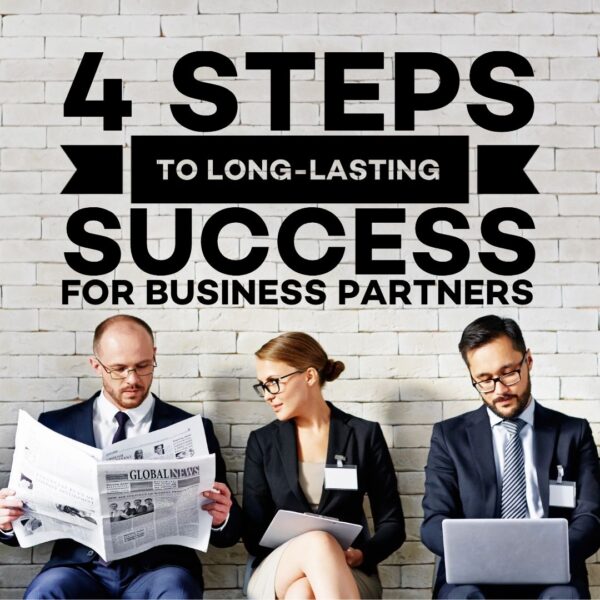
As in all close interpersonal relationships, when business professionals are unaware of different relationship styles—without a compatible mindset, and set of tools, and skills they can use together—each partner individually reverts to what they know best. What they know best is typically unconscious, old, less functional, patterns.
This article will tackle these three points of context and answer the following questions…
- What are the pitfalls of co-owning or operating a business with your partner
- Understanding the choices and consequences of relationship styles
- What are the four keys to a successful business partnership
Like everyone else, put two business owners together and you’ll find some random combination of approaches to relating which can get them in trouble when faced with conflict and their styles are different. Married couples in business together can be doubly susceptible since they live and work together.
I always say when partnerships (personal or professional) are going well, they are wonderful. It’s when faced with conflict or disagreements that relationship style differences bring on a challenge to change. What originally feels like a positive connection becomes confusing. Responses that used to work no longer work. Without new information, people do not know how to work themselves out of this sticky situation on their own. They can push it under the rug, but typically it does not go away without being addressed. That’s why many couples work with therapists or life coaches. In the world of work, business, and careers, having a business coach or business transformation consultant who understands the impacts that work and personal life have on one another is important for the success of your venture. It’s not therapy, but in the hands of a skilled coach, it is therapeutic, helps you grow as a person and business owner. Plus it saves time and money.
No one ever started a business or entered into a business partnership hoping to fail.
Any important relationship is challenged by differences. Business partners are not immune. They have a great deal at stake. When handled poorly, the negative impacts of a disconnected partnership on a business are just like tumult or divorce in a marriage. It can derail a promising future making it hard to grow or rebuild. Handled well, with a business coach for entrepreneurs, business partners can develop and retain a working connection. Together they create a mutual strength that protects the business from outside forces and allows it to flourish.
Choices and Consequences of Relationship Styles

Partners set goals, make decisions together effectively when they clarify relationship style.
Most people are not aware of how different relating styles operate. When relationship styles are unconsciously and randomly intermixed, it causes confusion and disrupts the flow of productivity. At a very basic level let’s say one partner is avoidant of conflict or minimizes it, and the other partner functions better when things are talked out. This partner may over-communicate in a way that becomes dysfunctional.
This scenario happens frequently in many relationships. Relationship troubles typically manifest in a disconnect in communication. Partners stop talking or blame one another and fight.
Most importantly, when disruption between the business partners goes on too long, it damages what should be a well-oiled, smooth functioning, trusting relationship focused on the business objectives. Ongoing conflict between business partners results in a trickle-down effect with employees and customers experiencing mixed messages, lack of consistency, and other forms of confusion. When it’s couples in business it trickles down to the kids and extended support system.
That’s where a business coach for entrepreneurs—especially skilled in business partnerships—can save you months of disconnect, hardship, and money. If you are a couple in business together, experience with the needs of couple relationships as well as business acumen is key to your success.

Coaching helps business owners clarify goals and achieve outcomes more effectively through each stage of business growth.
4 Styles of Relating in Business Partnerships + 4 Keys to Success
In my many years of experience as a business coach, I uncovered the root of this problem that can so negatively impact your business.
There are 4 unique relating styles you will find in related articles and blog posts. I encourage you to understand the differences so you can choose which style will guide you through the ups and downs of your work-life. As you develop your relationship skills they will benefit all of your relationships, both at work and at home. It’s life coaching for business. Your business will benefit from a knowledgeable business coach for entrepreneurs who can help you navigate your unique approaches to relating. An executive business coach will help you will feel more aligned and confident in how you handle many difficult situations.
While I will not go into each style in this article, you can learn about each relationship style in the links at the end of this article.
The 4 relationship styles and related articles are:
- The Dominant—Non-Dominant Relationship Style
- Business Partnerships With Undefined Roles
- Unilateral Decision-Making Relationship Style in Business Partnerships
- The Big Picture Partner Relationship Style
Each of the four relationship styles has a mindset or perspective which you can read about in the links. Each relies on certain types of decision-making, goal setting, and conflict resolution. Each style is not compatible with another style. Some are healthier than others. Committing to one relationship style is a necessity to have a smooth functioning relationship.

4 Steps to Achieve Success If You’re in a Business Partnership
- Get Educated About Different Relationship Styles and Consequences: Learning about the realities of different relationship styles, so you can choose which style works best for your relationship and business, will save you time, heartache, and profits. This is true especially when your long-standing relating styles may be different, or dramatically different, which is often the case between two strong entrepreneurial individuals.
- Commit and Recommit to a Relationship Style Together: When all partners make a conscious choice of how you’ll work together in business, implementing the relating style that matches your values and desired outcomes—both personal and professional—you’ll navigate differences, decision-making points, and hot-spots with greater ease, saving you both time and money.
- Stock Up Your Communication Toolkit and Refresh These Tools Periodically: Arm yourself with a Big Picture Partnering™ mindset, with the tools and skills to help you navigate common and potential pitfalls all business owners and business partners experience.
- Implement Win/Win Solutions to Save Time and Money: When you focus on implementing win/win, mutually satisfying solutions, so you as business partners have a better chance of successful outcomes, it’s more efficient, productive, profitable, and maybe even more fun! Why else are you running a business anyway?
I look forward to sharing more about these 4 relationship styles and helping you implement the mindset, tools, and skills necessary to run a successful business together.
If you’re an owner or founder and want to learn how we work, download the Executive Summary of Exactly How We Work on this page.
And if you already know a conversation would be useful, reach out – I’m ready when you are!
For more information go to our Business Partner portal and download both papers for business partners:
- Business Partners: How Choice of Relationship Style Impacts the Success of Your Business
- Business Partners: Tools to Make Decisions That Grow Your Business Together
- Check out other articles on Business Partner relationships on our blog.
- If you are a Dual-Career or Couple in business together check out our resources here.
- The Big Picture Partnering coaching for couples is found here and our blog is also rich in tips and tools.
Ready to assess your business and how improving your relationships can strengthen your outcomes? We’re ready to talk about your needs when you are.
- You Want to Grow But Your Business Has Stalled Out — It’s Time For a Reset - January 7, 2025
- Three Ways to Advance Your Career - October 7, 2024
- How to Take Your Business to the Next Level - October 3, 2024

